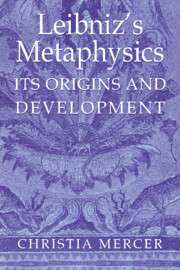Book contents
- Frontmatter
- Contents
- Acknowledgments
- References to Leibniz's works
- Introduction: first truths and half truths
- PART ONE METAPHYSICS OF METHOD
- PART TWO METAPHYSICS OF SUBSTANCE
- PART THREE METAPHYSICS OF DIVINITY
- PART FOUR METAPHYSICS
- 7 Matter, passivity, and panorganic vitalism, 1670–71
- 8 Phenomenalism and Preestablished Harmony, 1671
- 9 Preestablished Harmony, late 1671–early 1672
- 10 Final steps toward the mature philosophy, 1672–79
- Conclusion: the truth behind the First truths
- Appendix I (Not exactly) First truths
- Appendix II Leibniz's original assumptions
- Bibliography
- Index Locorum
- Index
9 - Preestablished Harmony, late 1671–early 1672
from PART FOUR - METAPHYSICS
Published online by Cambridge University Press: 12 March 2010
- Frontmatter
- Contents
- Acknowledgments
- References to Leibniz's works
- Introduction: first truths and half truths
- PART ONE METAPHYSICS OF METHOD
- PART TWO METAPHYSICS OF SUBSTANCE
- PART THREE METAPHYSICS OF DIVINITY
- PART FOUR METAPHYSICS
- 7 Matter, passivity, and panorganic vitalism, 1670–71
- 8 Phenomenalism and Preestablished Harmony, 1671
- 9 Preestablished Harmony, late 1671–early 1672
- 10 Final steps toward the mature philosophy, 1672–79
- Conclusion: the truth behind the First truths
- Appendix I (Not exactly) First truths
- Appendix II Leibniz's original assumptions
- Bibliography
- Index Locorum
- Index
Summary
Sometime between the middle of 1671 and his departure for Paris in March 1672, Leibniz took notes on a book written by the English philosopher, John Wilkins. The book, entitled Essay towards a Real Character and a Philosophical Language, is a hodgepodge of various topics concerning language, with a final section on the universal characteristic. As the title page announces, the author is Dean of Ripon and a member of the Royal Society; in his book, he intends to give a “general Scheme of things.” The notes that Leibniz took on the book and that the Academy editors have entitled Studies on the universal characteristic bear little resemblance to anything in Wilkins' text. Although Leibniz accepts the classification scheme used in the first chapter of the Essay, his proposals have nothing else in common with those of its author. Whereas Wilkins begins by defining ‘Genus’ and ‘Species,’ Leibniz begins with ‘Something (Aliquid)’ and ‘Nothing (Nihil).’ Whereas the former offers lists of synonyms and only the briefest of explications, the latter gives relatively carefully wrought definitions. Nor do the proposals in the remainder of Wilkins' book bear any similarity to those of Leibniz. The claims in Leibniz's notes are entirely his own and owe nothing to Wilkins.
- Type
- Chapter
- Information
- Leibniz's MetaphysicsIts Origins and Development, pp. 345 - 384Publisher: Cambridge University PressPrint publication year: 2001



